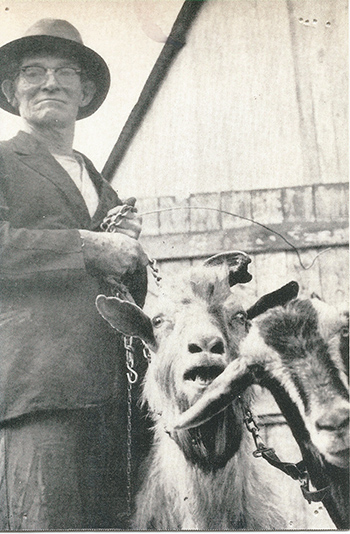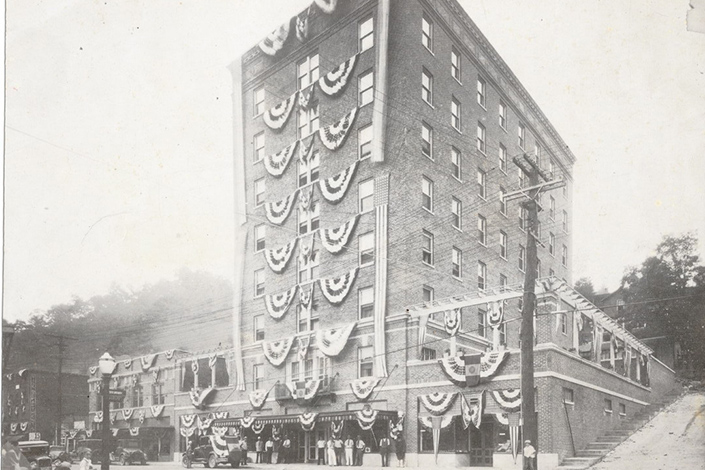University of Virginia doctoral student and Institute for Public History summer fellow Meredith McCool once helped her students in Anchorage, Alaska collect oral histories from survivors of a 1964 earthquake, culling stories of survival, hope and resilience. U.Va.-Wise student Tessa-McCoy Hall, a research fellow for the APPalachian Prosperity Project and the Center for Appalachia Studies at U.Va.-Wise, is a poet who writes about the Southwest Virginia area where she grew up.
This summer, the pair brought these approaches to the small Southwest Virginia town of Appalachia, interviewing residents to preserve the town’s past and build hopes for its future. The summer fellowships are supported by the APPalachian Prosperity Project, a partnership between U.Va. and U.Va.-Wise and a number of public and private partners in the Coalfield Region of Southwest Virginia.
McCool, a student in the Curry School of Education, and McCoy-Hall, a senior studying communications, are working with the APPalachian Prosperity Project to build an oral history of Appalachia, population roughly 1,900.
Over the weekend, McCool and McCoy-Hall presented the oral histories during the annual Coal/Railroad Days festival and led discussions about the town’s past and, more importantly, its future. Residents viewed excerpts from the oral histories, recorded short snippets of their own thoughts and memories and shared ideas, both in-person and through the social media campaign #visionsofappalachia.
This fall, the Appalachia Cultural Arts Center will begin to develop the oral histories into a community play, to be performed at the center’s theater, which has anchored the town’s Main Street even as other businesses have come and gone.
“We hope this project will generate discussion about new economic drivers for the town, particularly the heritage tourism economy and, just as importantly, remind community members and others about the people, work, and place that made Appalachia a thriving town ” said Suzanne Morse Moomaw, associate professor of urban and environmental planning in the U.Va. School of Architecture and faculty research lead for the APPalachian Prosperity Project.
Appalachia has been searching for a new economic engine since the decline of the coal mining and railroad industries and many see heritage tourism and recreation as the answer. McCool and McCoy-Hall are using their presentation at the Coal/Railroad days to spur new ideas for growth.
“It is one thing to be on the fringes of a problem and know that it is happening, but to sit down with people, hear their memories and realize what is truly at stake integrates you into the problem and makes you want to be a part of the solution,” McCoy-Hall said.
The pair hopes their efforts will bring more voices into that discussion and help people connect around common solutions.
“People here have so many thoughtful ideas about the future of the town. We want to honor the ideas that we have heard in our interviews and ask for other perspectives,” McCool said.

Appalachia resident Sally West, along with his herd of goats, came up in several anecdotes. (Photo provided by Meredith McCool)
Some researchers might have stopped there, content with a few colorful anecdotes embodying the stereotype of small-town Appalachia that began with a 1964 LIFE Magazine story on the War on Poverty and continues today.
McCool and McCoy-Hall wanted their oral history to go beyond the stereotype. They heard stories of an extraordinary community – mothers waking early to sweep the town’s streets, fathers putting together Christmas baskets for neighbors in need. They met a photographer inspired by the landscape he grew up in, a memoirist motivated by her mother’s love of poetry, and a U.Va..-educated doctor who returned to revitalize the local hospital.
Key themes recurred: the constancy of change, the perils of a boom-and-bust economy, the joy and sadness of the “brain drain” as some of the town’s brightest children went beyond its borders, worries about the next generation, but above all, deep pride of place.
“Over and over, we heard not about the poverty of the town, but about its generosity, community spirit and the resilience bred by the mountains,” McCool said.
The pair did encounter some skepticism. Other scholars, they learned, had collected oral histories only to leave without sharing their results. They are determined not to repeat that pattern.
“Everything we collect, while it will be used for study, will be returned to the town,” McCool said. “One of our main goals is to preserve the dignity of the people that opened up to us and give them the respect they deserve. They are thoughtful and insightful and hilarious and just good people and I want to make sure that we are honoring that and immediately giving back.”
“I have enjoyed the companionship with the townsfolk,” McCoy-Hall said. “They have become our friends, and it is great to feel that if we were to return, they would be truly glad to see us.”
The project has generated fresh discussions around ideas for economic growth – a demonstration coal mine and scenic railroad for tourists, improved trail systems for hikers and even the legalization of gambling, which previously played a large role in the town’s economy. Such discussions could generate improvement beyond the borders of Appalachia.
“The story of Appalachia is not unique to this particular area. It really is a universal story of change and boom-and-bust cycles,” McCool said. It is also, she said, a lesson in the negative effects of stereotyping. It is part of a big-picture discussion about what arts and culture can do to broaden people’s perspectives and make sure that everyone is treated with dignity and respect.”
Media Contact
Article Information
August 3, 2015
/content/uva-uva-wise-students-preserve-past-discuss-future-appalachia-va

